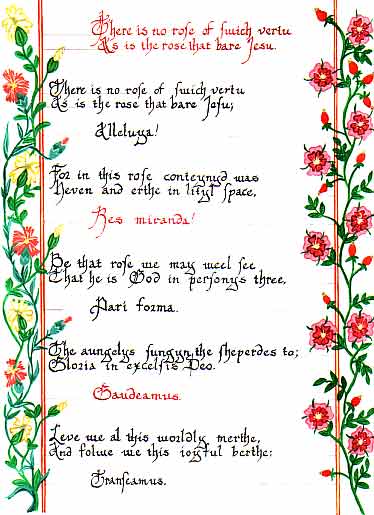| Archery |
| Brewing |
| Calligraphy & writing |
| Combat |
| Cooking |
| Dance |
| Etiquette |
| Household life |
| Medicine |
| Music |
| Needlework |
| Playacting |
| Religion |
| Storytelling |

Ther is no rose
of swych vertu
(15th century)
| Ther is no rose of swiche vertu | The Virgin Mary was often referred to as the Rose. |
| As is the rose that bare Jesu | |
| Ther is no rose of swych vertu | such |
| As is the rose that bare Jesu; | |
| Allelulya! | |
| For in this rose conteyned was | |
| Heven and erthe in lytyl space, | |
| Res Miranda | A matter for marvel |
| Be that rose we may weel see | By… well |
| That he is God in personys three, | |
| Pari forma | In one substance |
| The aungelys sungen the sheperdes to | The angels sung to... |
| Gloria in excelsid Deo | Glory to God in the highest |
| Gaudeamus | Let us rejoice |
| Leve we al this wordly merthe | worldly |
| And folwe we this joyful berthe; | follow |
| Transeamus | Let us go on |
Glad and blithe
mote ye be
(c. 1450)
| Glad and blithe mote ye be, may | |
| All that ever I here nowe se, | |
| Alleluia! | |
| Kinge of kingis, Lord of alle, | |
| Borne he is in oxe stalle, | |
| Res Miranda. | Matter for wonder |
| The angel of consel now borne he is | councellor spirit (ie “Word of God”) |
| Of a maide full clene, iwis, | indeed |
| Sol de stella. | Sun from the star |
| The sunne that ever shineth bright, | |
| The sterre that ever yeveth his light, | gives |
| Semper clara. | Always bright |
| Right as the sterre bringeth forthe his beme, | |
| So the maide here barn teme. | So the maid brought forth her child |
| Pari forma. | Of like nature |
| Nother the sterre for his beme, | |
| Nother the maide for her barne-teme | Nor was the maid... |
| Fit corrupta. | Corrupted by her child bearing |
| The cedur of Liban that growth so hie | |
| Unto the hysope is made lie | Is made to lie with the hyssop |
| Valle nostra. | In our valley |
| Godis sone of Heven bright | |
| Until a maide is he light, | Upon a maid has he alighted |
| Carne sumpta. | Having taken flesh |
| Isaye saide by prophecye | Isaiah foretold |
| The Synagoge hath it in memorye, | ie Jews of the Old Testament |
| Yit never he lynneth maliciously | remembers it but, wickedly, never ceases |
| Esse ceca. | To be blind |
| If they leve not here prophetis | do not believe their |
| Then lete hem leve hethen metris, | let them believe heathen poems |
| In sybyllinis versiculis | What was prophecied in Sybilline verses |
| Hec predicta. | |
| Unhappy Jewe, come thu nere, | Unfortunate |
| Beleve ellis thine eldere. | Or believe the Ancients (of your race) |
| Why wolt thu, wretch, idampned be? | |
| Whomme techeth the letter – | Him whom the scriptures show |
| Beholde the childe the better – | |
| Him bare a maide-moder, Marye. | Him a maiden-mother, Mary, bore. |